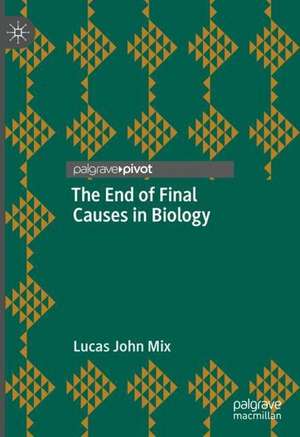The End of Final Causes in Biology
Autor Lucas John Mixen Limba Engleză Hardback – noi 2022
Preț: 351.92 lei
Nou
Puncte Express: 528
Preț estimativ în valută:
67.35€ • 69.57$ • 56.05£
67.35€ • 69.57$ • 56.05£
Carte tipărită la comandă
Livrare economică 26 martie-09 aprilie
Preluare comenzi: 021 569.72.76
Specificații
ISBN-13: 9783031140167
ISBN-10: 3031140168
Pagini: 149
Ilustrații: VII, 149 p.
Dimensiuni: 148 x 210 mm
Greutate: 0.35 kg
Ediția:1st ed. 2022
Editura: Springer International Publishing
Colecția Palgrave Macmillan
Locul publicării:Cham, Switzerland
ISBN-10: 3031140168
Pagini: 149
Ilustrații: VII, 149 p.
Dimensiuni: 148 x 210 mm
Greutate: 0.35 kg
Ediția:1st ed. 2022
Editura: Springer International Publishing
Colecția Palgrave Macmillan
Locul publicării:Cham, Switzerland
Cuprins
1. An End to Ends?.- 2. What Makes Life Life-Like? The Dynamic Continuity of Living Things.- 3. Vegetable Souls in the Middle Ages.- 4. Mechanical Organisms in the Enlightenment.- 5. Who “Acts” in Biology? Biological Agents from Souls to Genes.- 6. Genes: The New Biological Agent.- 7. Can Teleology Be Saved? Three Constraints on Bioteleology.- 8. Genes and Natural Selection Finalize Nature.
Notă biografică
Dr. Lucas John Mix is the Blumberg NASA/Library of Congress Chair in Astrobiology and an associate in Organismic and Evolutionary Biology at Harvard. He studies life concepts at the intersection of science, philosophy and theology and has worked with NASA Astrobiology programs for the last 25 years on understanding the meaning and extent of life.
His previous books include Life in Space: Astrobiology for Everyone (2009) and Life Concepts from Aristotle to Darwin: On Vegetable Souls (2018).
His previous books include Life in Space: Astrobiology for Everyone (2009) and Life Concepts from Aristotle to Darwin: On Vegetable Souls (2018).
Textul de pe ultima copertă
This book provides a straightforward introduction to teleology in biology, the work it did and the work it can do. Informed by history and philosophy, it focuses on scientific concerns. Seventeenth, eighteenth, and nineteenth century biologists proposed a menagerie of biological “actors” to explain power without appealing to Aristotelian vegetable souls and final causes. Three constraints on teleology narrowed the field, selecting among the various actors as they mutated and recombined. Methodological naturalism, local adaptation, and blind chance each represent a significant philosophical advance in biology. Kant, Darwin, and the Modern Synthesis provided a new teleology, grounded in natural selection, an etiological recursion of form and function, and the details of carbon chemistry on Earth. They naturalized teleology, but they also finalized nature, shifting conceptions about the world and science. Understanding these links – historical, philosophical, and theoretical – sets the stage for new work moving forward.
Dr. Lucas John Mix is the Blumberg NASA/Library of Congress Chair in Astrobiology and an associate in Organismic and Evolutionary Biology at Harvard. He studies life concepts at the intersection of science, philosophy and theology and has worked with NASA Astrobiology programs for the last 25 years on understanding the meaning and extent of life.
His previous books include Life in Space: Astrobiology for Everyone (2009) and Life Concepts from Aristotle to Darwin: On Vegetable Souls (2018).
Caracteristici
Offers a straightforward introduction to critical teleology for biologists Informed by discussions in philosophy and history while remaining focused on scientific concerns Provides an account of how modern biology has constrained teleological thinking and language over last three centuries
